Ethical Dilemmas in Nursing: A Case Study on Confidentiality
VerifiedAdded on 2022/11/13
|8
|2093
|434
Case Study
AI Summary
This case study examines a complex ethical dilemma faced by a nurse, Sam, regarding a pregnant fifteen-year-old patient, Jessica, who confides in him but requests that her parents not be informed. The assignment requires an analysis of the ethical issue of confidentiality, exploring its implications within the context of nursing practice. The analysis delves into the ethical and legal principles that govern patient confidentiality, including consequentialist and deontological viewpoints, and relevant legal precedents. The core of the assignment involves evaluating options available to Sam, such as maintaining confidentiality or disclosing information, considering the patient's age, the potential risks of the pregnancy, and the involvement of the patient's mother. The student reflects on these options, emphasizing the importance of patient autonomy, the role of ethical codes, and the balance between confidentiality and the duty to act in the patient's best interest, ultimately concluding with a recommendation on how Sam should proceed, supporting the patient's autonomy while considering all ethical and legal implications.
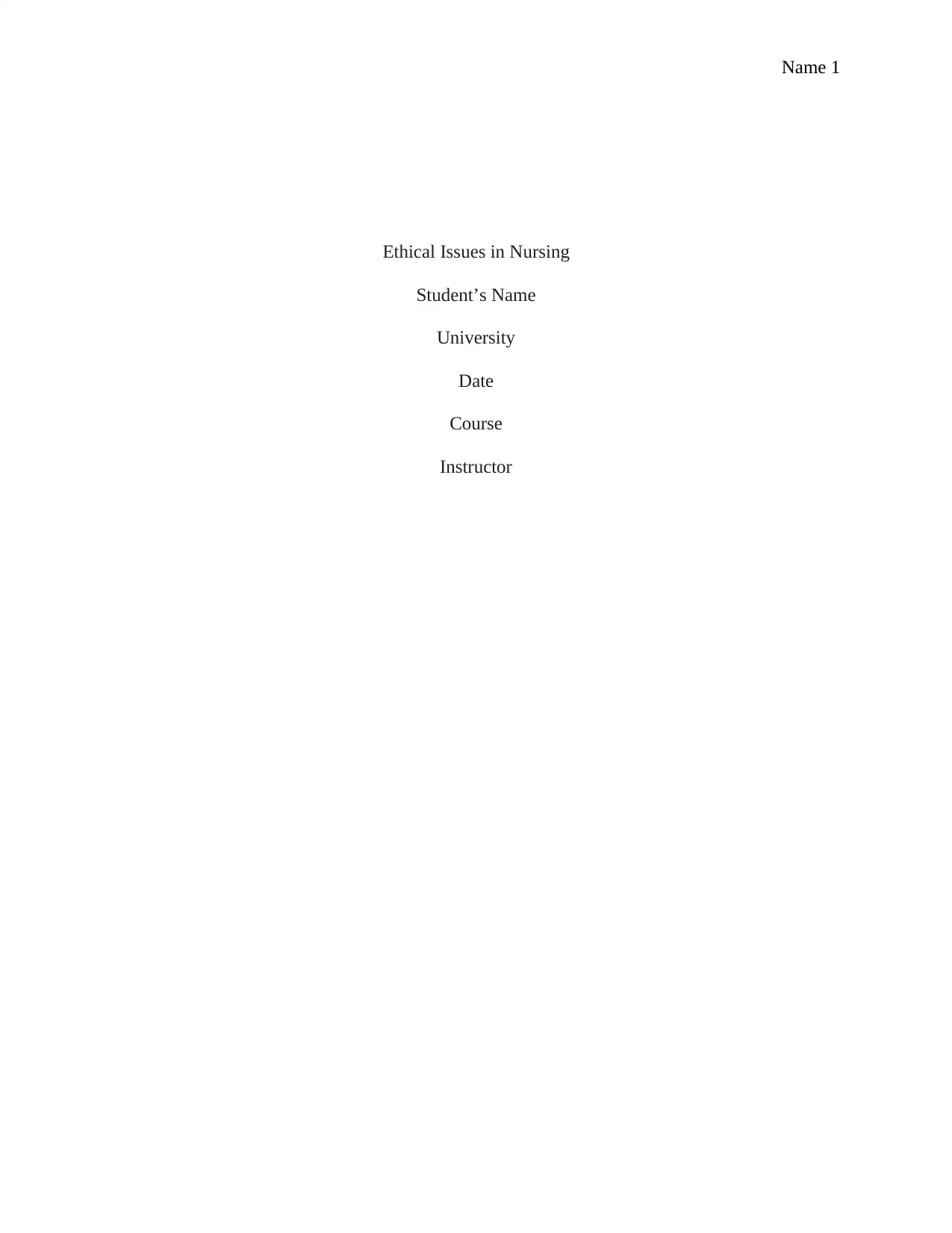
Name 1
Ethical Issues in Nursing
Student’s Name
University
Date
Course
Instructor
Ethical Issues in Nursing
Student’s Name
University
Date
Course
Instructor
Paraphrase This Document
Need a fresh take? Get an instant paraphrase of this document with our AI Paraphraser
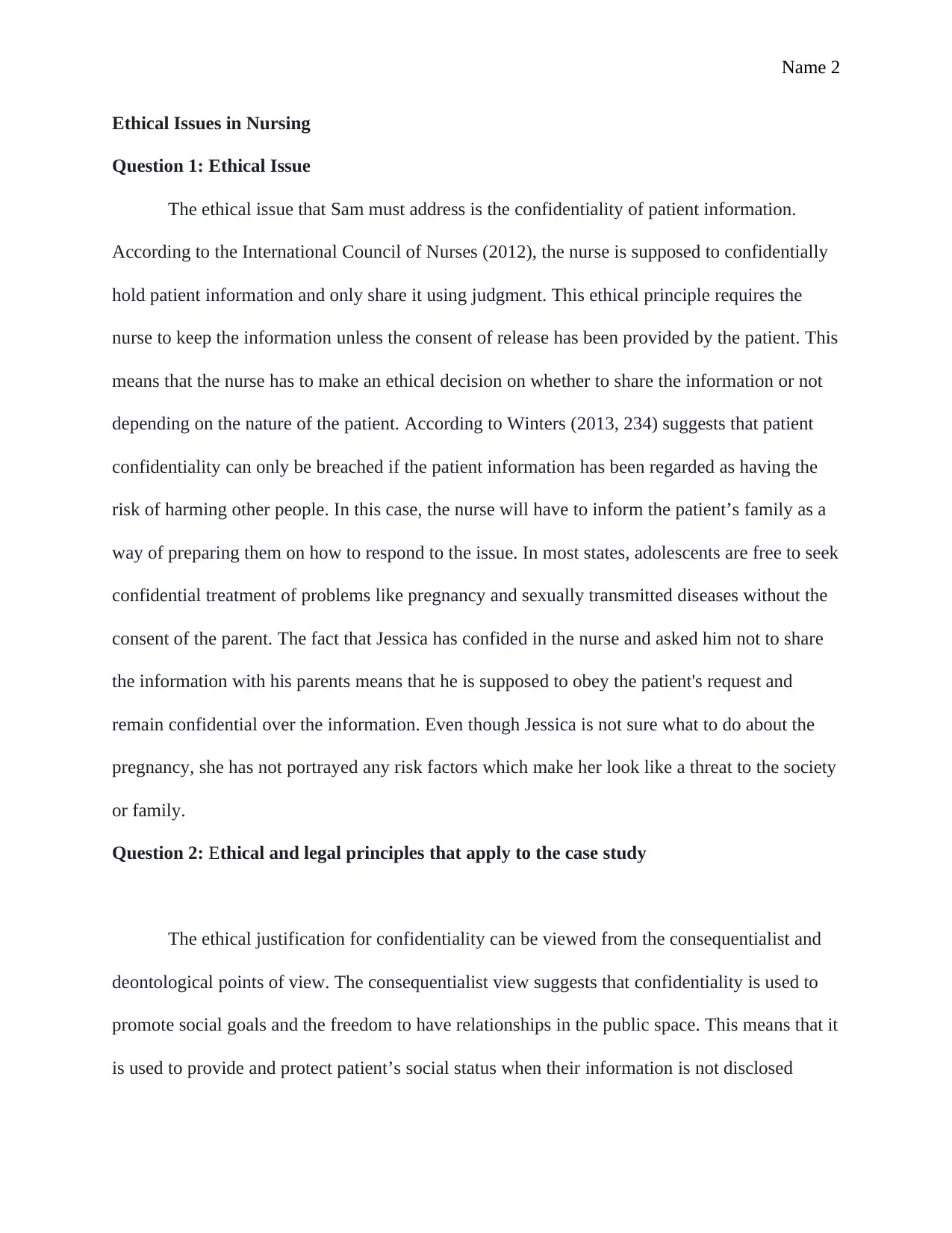
Name 2
Ethical Issues in Nursing
Question 1: Ethical Issue
The ethical issue that Sam must address is the confidentiality of patient information.
According to the International Council of Nurses (2012), the nurse is supposed to confidentially
hold patient information and only share it using judgment. This ethical principle requires the
nurse to keep the information unless the consent of release has been provided by the patient. This
means that the nurse has to make an ethical decision on whether to share the information or not
depending on the nature of the patient. According to Winters (2013, 234) suggests that patient
confidentiality can only be breached if the patient information has been regarded as having the
risk of harming other people. In this case, the nurse will have to inform the patient’s family as a
way of preparing them on how to respond to the issue. In most states, adolescents are free to seek
confidential treatment of problems like pregnancy and sexually transmitted diseases without the
consent of the parent. The fact that Jessica has confided in the nurse and asked him not to share
the information with his parents means that he is supposed to obey the patient's request and
remain confidential over the information. Even though Jessica is not sure what to do about the
pregnancy, she has not portrayed any risk factors which make her look like a threat to the society
or family.
Question 2: Ethical and legal principles that apply to the case study
The ethical justification for confidentiality can be viewed from the consequentialist and
deontological points of view. The consequentialist view suggests that confidentiality is used to
promote social goals and the freedom to have relationships in the public space. This means that it
is used to provide and protect patient’s social status when their information is not disclosed
Ethical Issues in Nursing
Question 1: Ethical Issue
The ethical issue that Sam must address is the confidentiality of patient information.
According to the International Council of Nurses (2012), the nurse is supposed to confidentially
hold patient information and only share it using judgment. This ethical principle requires the
nurse to keep the information unless the consent of release has been provided by the patient. This
means that the nurse has to make an ethical decision on whether to share the information or not
depending on the nature of the patient. According to Winters (2013, 234) suggests that patient
confidentiality can only be breached if the patient information has been regarded as having the
risk of harming other people. In this case, the nurse will have to inform the patient’s family as a
way of preparing them on how to respond to the issue. In most states, adolescents are free to seek
confidential treatment of problems like pregnancy and sexually transmitted diseases without the
consent of the parent. The fact that Jessica has confided in the nurse and asked him not to share
the information with his parents means that he is supposed to obey the patient's request and
remain confidential over the information. Even though Jessica is not sure what to do about the
pregnancy, she has not portrayed any risk factors which make her look like a threat to the society
or family.
Question 2: Ethical and legal principles that apply to the case study
The ethical justification for confidentiality can be viewed from the consequentialist and
deontological points of view. The consequentialist view suggests that confidentiality is used to
promote social goals and the freedom to have relationships in the public space. This means that it
is used to provide and protect patient’s social status when their information is not disclosed
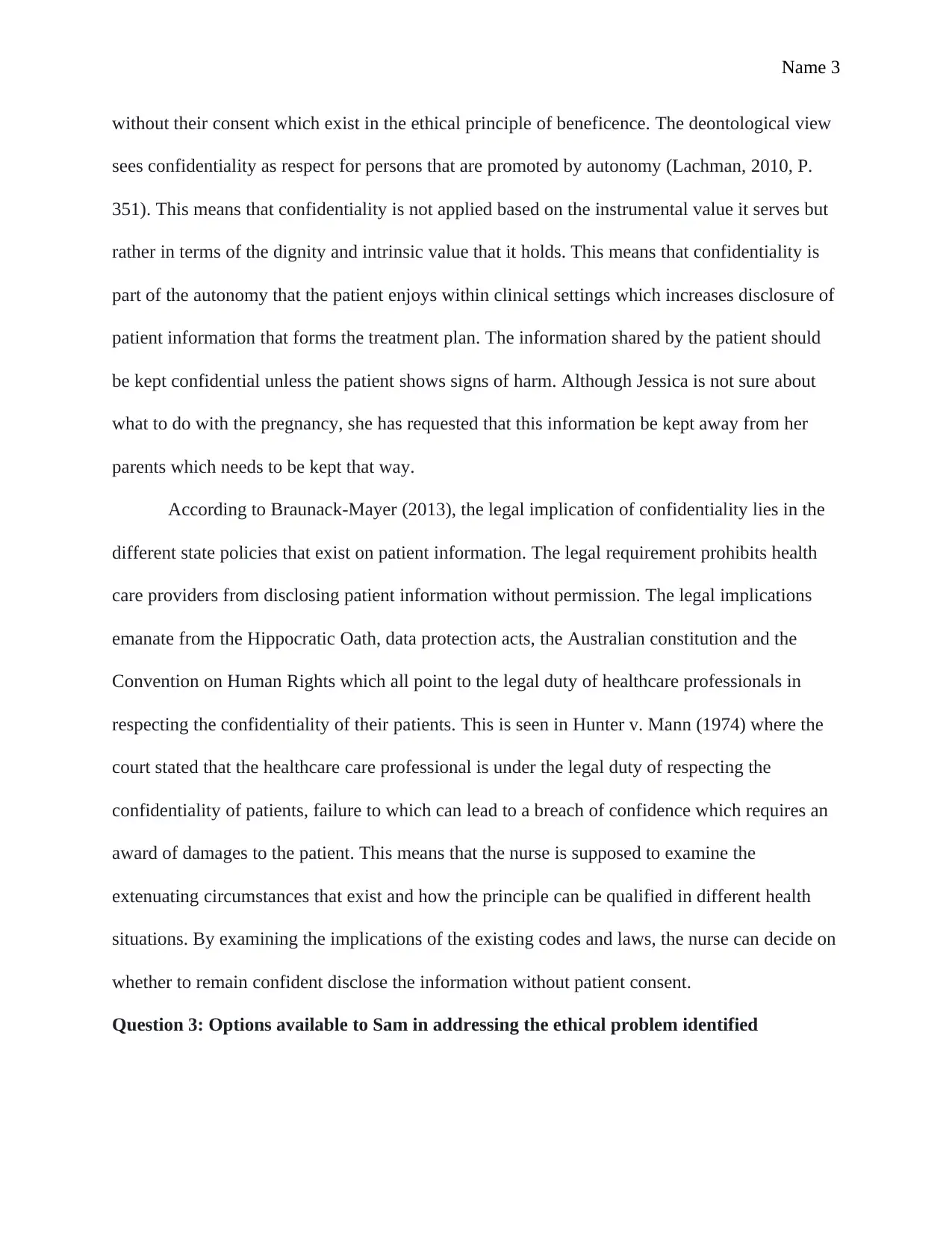
Name 3
without their consent which exist in the ethical principle of beneficence. The deontological view
sees confidentiality as respect for persons that are promoted by autonomy (Lachman, 2010, P.
351). This means that confidentiality is not applied based on the instrumental value it serves but
rather in terms of the dignity and intrinsic value that it holds. This means that confidentiality is
part of the autonomy that the patient enjoys within clinical settings which increases disclosure of
patient information that forms the treatment plan. The information shared by the patient should
be kept confidential unless the patient shows signs of harm. Although Jessica is not sure about
what to do with the pregnancy, she has requested that this information be kept away from her
parents which needs to be kept that way.
According to Braunack-Mayer (2013), the legal implication of confidentiality lies in the
different state policies that exist on patient information. The legal requirement prohibits health
care providers from disclosing patient information without permission. The legal implications
emanate from the Hippocratic Oath, data protection acts, the Australian constitution and the
Convention on Human Rights which all point to the legal duty of healthcare professionals in
respecting the confidentiality of their patients. This is seen in Hunter v. Mann (1974) where the
court stated that the healthcare care professional is under the legal duty of respecting the
confidentiality of patients, failure to which can lead to a breach of confidence which requires an
award of damages to the patient. This means that the nurse is supposed to examine the
extenuating circumstances that exist and how the principle can be qualified in different health
situations. By examining the implications of the existing codes and laws, the nurse can decide on
whether to remain confident disclose the information without patient consent.
Question 3: Options available to Sam in addressing the ethical problem identified
without their consent which exist in the ethical principle of beneficence. The deontological view
sees confidentiality as respect for persons that are promoted by autonomy (Lachman, 2010, P.
351). This means that confidentiality is not applied based on the instrumental value it serves but
rather in terms of the dignity and intrinsic value that it holds. This means that confidentiality is
part of the autonomy that the patient enjoys within clinical settings which increases disclosure of
patient information that forms the treatment plan. The information shared by the patient should
be kept confidential unless the patient shows signs of harm. Although Jessica is not sure about
what to do with the pregnancy, she has requested that this information be kept away from her
parents which needs to be kept that way.
According to Braunack-Mayer (2013), the legal implication of confidentiality lies in the
different state policies that exist on patient information. The legal requirement prohibits health
care providers from disclosing patient information without permission. The legal implications
emanate from the Hippocratic Oath, data protection acts, the Australian constitution and the
Convention on Human Rights which all point to the legal duty of healthcare professionals in
respecting the confidentiality of their patients. This is seen in Hunter v. Mann (1974) where the
court stated that the healthcare care professional is under the legal duty of respecting the
confidentiality of patients, failure to which can lead to a breach of confidence which requires an
award of damages to the patient. This means that the nurse is supposed to examine the
extenuating circumstances that exist and how the principle can be qualified in different health
situations. By examining the implications of the existing codes and laws, the nurse can decide on
whether to remain confident disclose the information without patient consent.
Question 3: Options available to Sam in addressing the ethical problem identified
⊘ This is a preview!⊘
Do you want full access?
Subscribe today to unlock all pages.

Trusted by 1+ million students worldwide
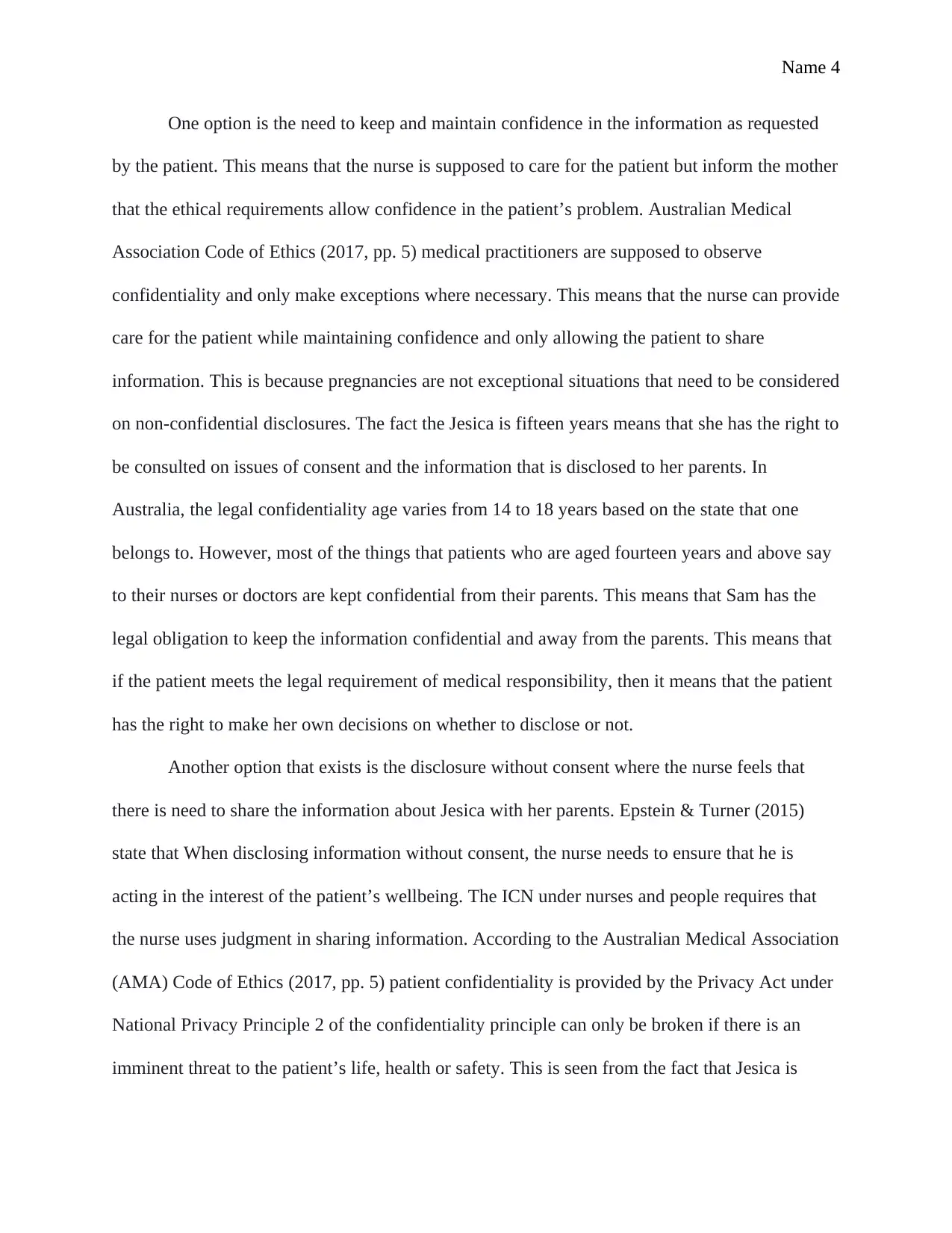
Name 4
One option is the need to keep and maintain confidence in the information as requested
by the patient. This means that the nurse is supposed to care for the patient but inform the mother
that the ethical requirements allow confidence in the patient’s problem. Australian Medical
Association Code of Ethics (2017, pp. 5) medical practitioners are supposed to observe
confidentiality and only make exceptions where necessary. This means that the nurse can provide
care for the patient while maintaining confidence and only allowing the patient to share
information. This is because pregnancies are not exceptional situations that need to be considered
on non-confidential disclosures. The fact the Jesica is fifteen years means that she has the right to
be consulted on issues of consent and the information that is disclosed to her parents. In
Australia, the legal confidentiality age varies from 14 to 18 years based on the state that one
belongs to. However, most of the things that patients who are aged fourteen years and above say
to their nurses or doctors are kept confidential from their parents. This means that Sam has the
legal obligation to keep the information confidential and away from the parents. This means that
if the patient meets the legal requirement of medical responsibility, then it means that the patient
has the right to make her own decisions on whether to disclose or not.
Another option that exists is the disclosure without consent where the nurse feels that
there is need to share the information about Jesica with her parents. Epstein & Turner (2015)
state that When disclosing information without consent, the nurse needs to ensure that he is
acting in the interest of the patient’s wellbeing. The ICN under nurses and people requires that
the nurse uses judgment in sharing information. According to the Australian Medical Association
(AMA) Code of Ethics (2017, pp. 5) patient confidentiality is provided by the Privacy Act under
National Privacy Principle 2 of the confidentiality principle can only be broken if there is an
imminent threat to the patient’s life, health or safety. This is seen from the fact that Jesica is
One option is the need to keep and maintain confidence in the information as requested
by the patient. This means that the nurse is supposed to care for the patient but inform the mother
that the ethical requirements allow confidence in the patient’s problem. Australian Medical
Association Code of Ethics (2017, pp. 5) medical practitioners are supposed to observe
confidentiality and only make exceptions where necessary. This means that the nurse can provide
care for the patient while maintaining confidence and only allowing the patient to share
information. This is because pregnancies are not exceptional situations that need to be considered
on non-confidential disclosures. The fact the Jesica is fifteen years means that she has the right to
be consulted on issues of consent and the information that is disclosed to her parents. In
Australia, the legal confidentiality age varies from 14 to 18 years based on the state that one
belongs to. However, most of the things that patients who are aged fourteen years and above say
to their nurses or doctors are kept confidential from their parents. This means that Sam has the
legal obligation to keep the information confidential and away from the parents. This means that
if the patient meets the legal requirement of medical responsibility, then it means that the patient
has the right to make her own decisions on whether to disclose or not.
Another option that exists is the disclosure without consent where the nurse feels that
there is need to share the information about Jesica with her parents. Epstein & Turner (2015)
state that When disclosing information without consent, the nurse needs to ensure that he is
acting in the interest of the patient’s wellbeing. The ICN under nurses and people requires that
the nurse uses judgment in sharing information. According to the Australian Medical Association
(AMA) Code of Ethics (2017, pp. 5) patient confidentiality is provided by the Privacy Act under
National Privacy Principle 2 of the confidentiality principle can only be broken if there is an
imminent threat to the patient’s life, health or safety. This is seen from the fact that Jesica is
Paraphrase This Document
Need a fresh take? Get an instant paraphrase of this document with our AI Paraphraser
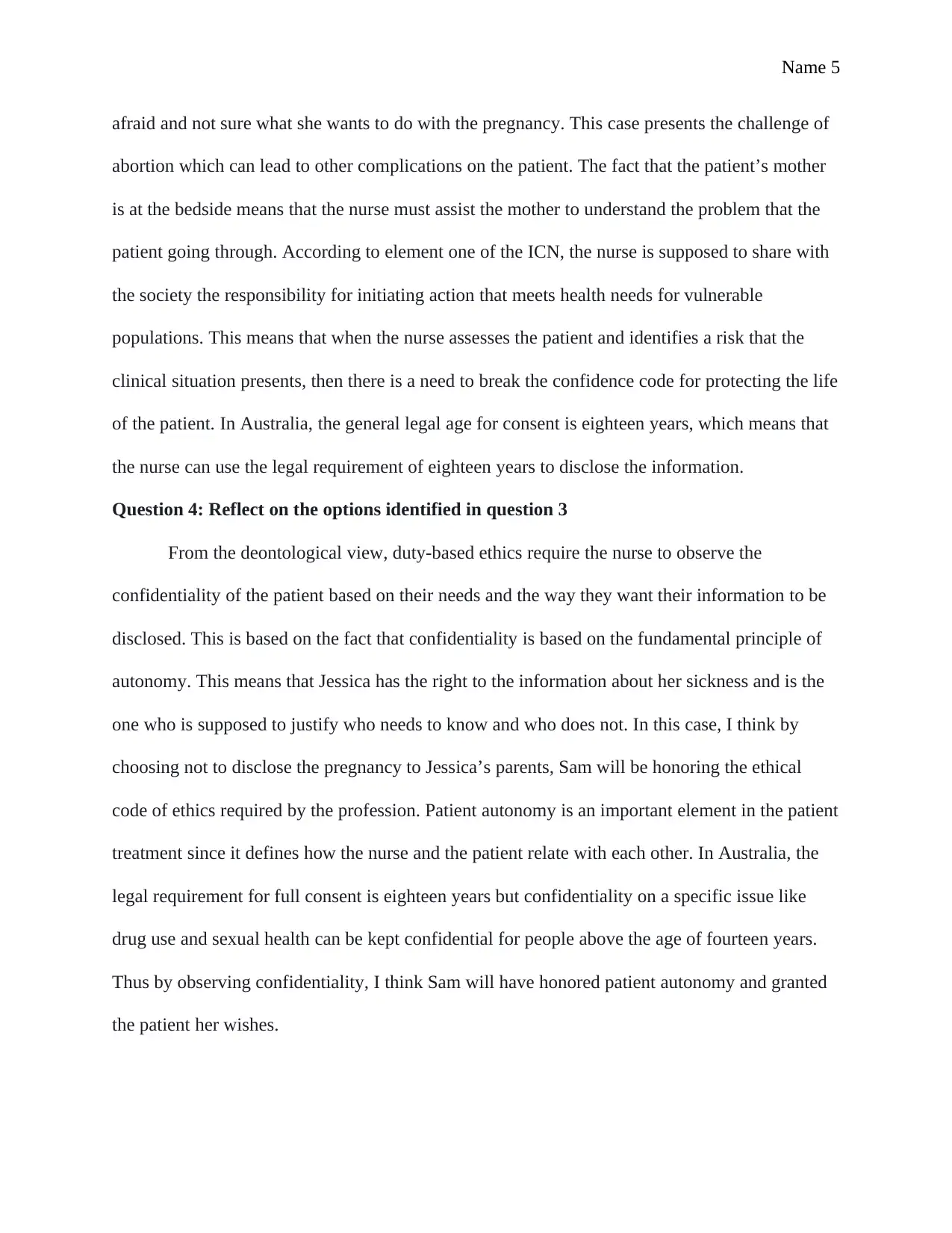
Name 5
afraid and not sure what she wants to do with the pregnancy. This case presents the challenge of
abortion which can lead to other complications on the patient. The fact that the patient’s mother
is at the bedside means that the nurse must assist the mother to understand the problem that the
patient going through. According to element one of the ICN, the nurse is supposed to share with
the society the responsibility for initiating action that meets health needs for vulnerable
populations. This means that when the nurse assesses the patient and identifies a risk that the
clinical situation presents, then there is a need to break the confidence code for protecting the life
of the patient. In Australia, the general legal age for consent is eighteen years, which means that
the nurse can use the legal requirement of eighteen years to disclose the information.
Question 4: Reflect on the options identified in question 3
From the deontological view, duty-based ethics require the nurse to observe the
confidentiality of the patient based on their needs and the way they want their information to be
disclosed. This is based on the fact that confidentiality is based on the fundamental principle of
autonomy. This means that Jessica has the right to the information about her sickness and is the
one who is supposed to justify who needs to know and who does not. In this case, I think by
choosing not to disclose the pregnancy to Jessica’s parents, Sam will be honoring the ethical
code of ethics required by the profession. Patient autonomy is an important element in the patient
treatment since it defines how the nurse and the patient relate with each other. In Australia, the
legal requirement for full consent is eighteen years but confidentiality on a specific issue like
drug use and sexual health can be kept confidential for people above the age of fourteen years.
Thus by observing confidentiality, I think Sam will have honored patient autonomy and granted
the patient her wishes.
afraid and not sure what she wants to do with the pregnancy. This case presents the challenge of
abortion which can lead to other complications on the patient. The fact that the patient’s mother
is at the bedside means that the nurse must assist the mother to understand the problem that the
patient going through. According to element one of the ICN, the nurse is supposed to share with
the society the responsibility for initiating action that meets health needs for vulnerable
populations. This means that when the nurse assesses the patient and identifies a risk that the
clinical situation presents, then there is a need to break the confidence code for protecting the life
of the patient. In Australia, the general legal age for consent is eighteen years, which means that
the nurse can use the legal requirement of eighteen years to disclose the information.
Question 4: Reflect on the options identified in question 3
From the deontological view, duty-based ethics require the nurse to observe the
confidentiality of the patient based on their needs and the way they want their information to be
disclosed. This is based on the fact that confidentiality is based on the fundamental principle of
autonomy. This means that Jessica has the right to the information about her sickness and is the
one who is supposed to justify who needs to know and who does not. In this case, I think by
choosing not to disclose the pregnancy to Jessica’s parents, Sam will be honoring the ethical
code of ethics required by the profession. Patient autonomy is an important element in the patient
treatment since it defines how the nurse and the patient relate with each other. In Australia, the
legal requirement for full consent is eighteen years but confidentiality on a specific issue like
drug use and sexual health can be kept confidential for people above the age of fourteen years.
Thus by observing confidentiality, I think Sam will have honored patient autonomy and granted
the patient her wishes.
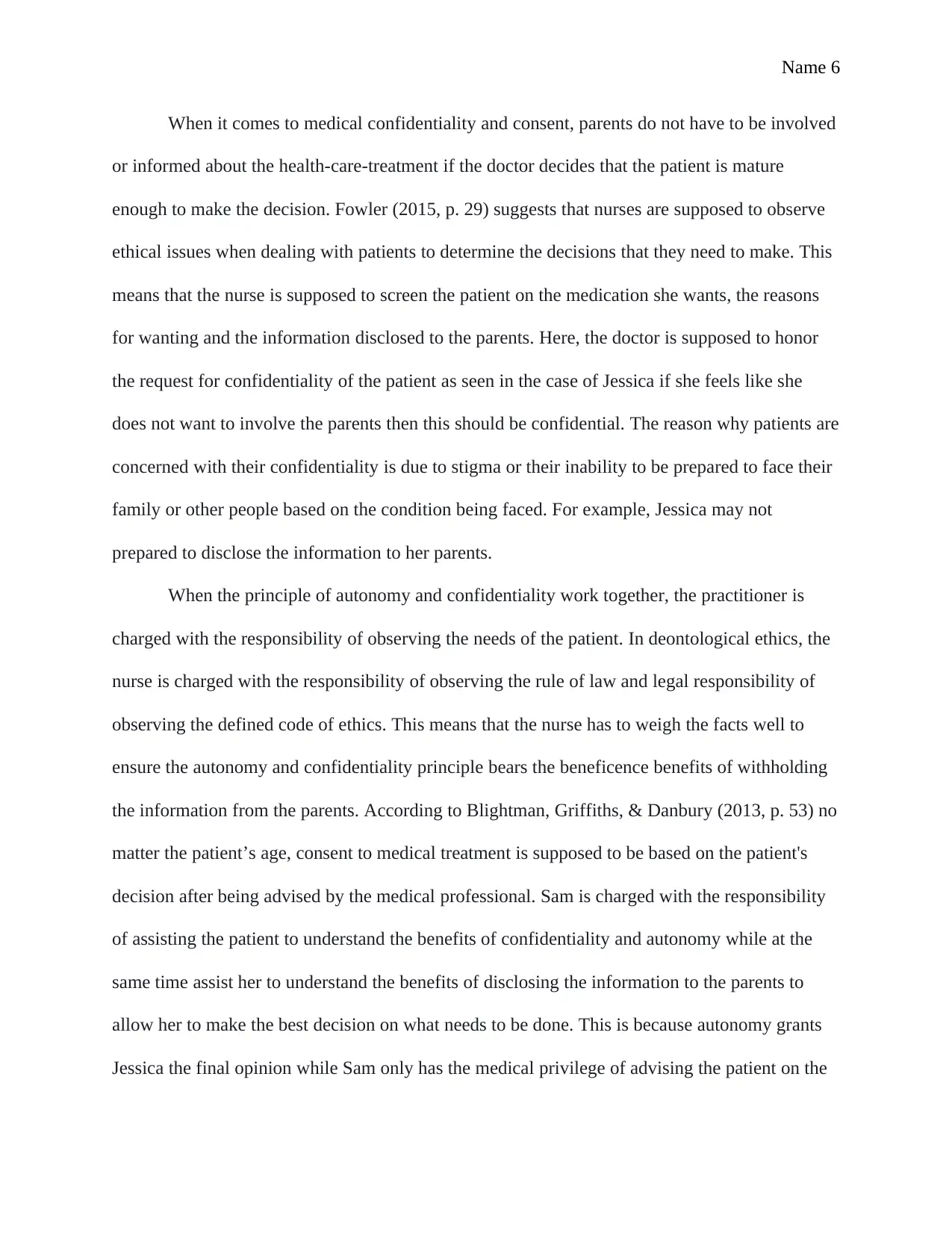
Name 6
When it comes to medical confidentiality and consent, parents do not have to be involved
or informed about the health-care-treatment if the doctor decides that the patient is mature
enough to make the decision. Fowler (2015, p. 29) suggests that nurses are supposed to observe
ethical issues when dealing with patients to determine the decisions that they need to make. This
means that the nurse is supposed to screen the patient on the medication she wants, the reasons
for wanting and the information disclosed to the parents. Here, the doctor is supposed to honor
the request for confidentiality of the patient as seen in the case of Jessica if she feels like she
does not want to involve the parents then this should be confidential. The reason why patients are
concerned with their confidentiality is due to stigma or their inability to be prepared to face their
family or other people based on the condition being faced. For example, Jessica may not
prepared to disclose the information to her parents.
When the principle of autonomy and confidentiality work together, the practitioner is
charged with the responsibility of observing the needs of the patient. In deontological ethics, the
nurse is charged with the responsibility of observing the rule of law and legal responsibility of
observing the defined code of ethics. This means that the nurse has to weigh the facts well to
ensure the autonomy and confidentiality principle bears the beneficence benefits of withholding
the information from the parents. According to Blightman, Griffiths, & Danbury (2013, p. 53) no
matter the patient’s age, consent to medical treatment is supposed to be based on the patient's
decision after being advised by the medical professional. Sam is charged with the responsibility
of assisting the patient to understand the benefits of confidentiality and autonomy while at the
same time assist her to understand the benefits of disclosing the information to the parents to
allow her to make the best decision on what needs to be done. This is because autonomy grants
Jessica the final opinion while Sam only has the medical privilege of advising the patient on the
When it comes to medical confidentiality and consent, parents do not have to be involved
or informed about the health-care-treatment if the doctor decides that the patient is mature
enough to make the decision. Fowler (2015, p. 29) suggests that nurses are supposed to observe
ethical issues when dealing with patients to determine the decisions that they need to make. This
means that the nurse is supposed to screen the patient on the medication she wants, the reasons
for wanting and the information disclosed to the parents. Here, the doctor is supposed to honor
the request for confidentiality of the patient as seen in the case of Jessica if she feels like she
does not want to involve the parents then this should be confidential. The reason why patients are
concerned with their confidentiality is due to stigma or their inability to be prepared to face their
family or other people based on the condition being faced. For example, Jessica may not
prepared to disclose the information to her parents.
When the principle of autonomy and confidentiality work together, the practitioner is
charged with the responsibility of observing the needs of the patient. In deontological ethics, the
nurse is charged with the responsibility of observing the rule of law and legal responsibility of
observing the defined code of ethics. This means that the nurse has to weigh the facts well to
ensure the autonomy and confidentiality principle bears the beneficence benefits of withholding
the information from the parents. According to Blightman, Griffiths, & Danbury (2013, p. 53) no
matter the patient’s age, consent to medical treatment is supposed to be based on the patient's
decision after being advised by the medical professional. Sam is charged with the responsibility
of assisting the patient to understand the benefits of confidentiality and autonomy while at the
same time assist her to understand the benefits of disclosing the information to the parents to
allow her to make the best decision on what needs to be done. This is because autonomy grants
Jessica the final opinion while Sam only has the medical privilege of advising the patient on the
⊘ This is a preview!⊘
Do you want full access?
Subscribe today to unlock all pages.

Trusted by 1+ million students worldwide
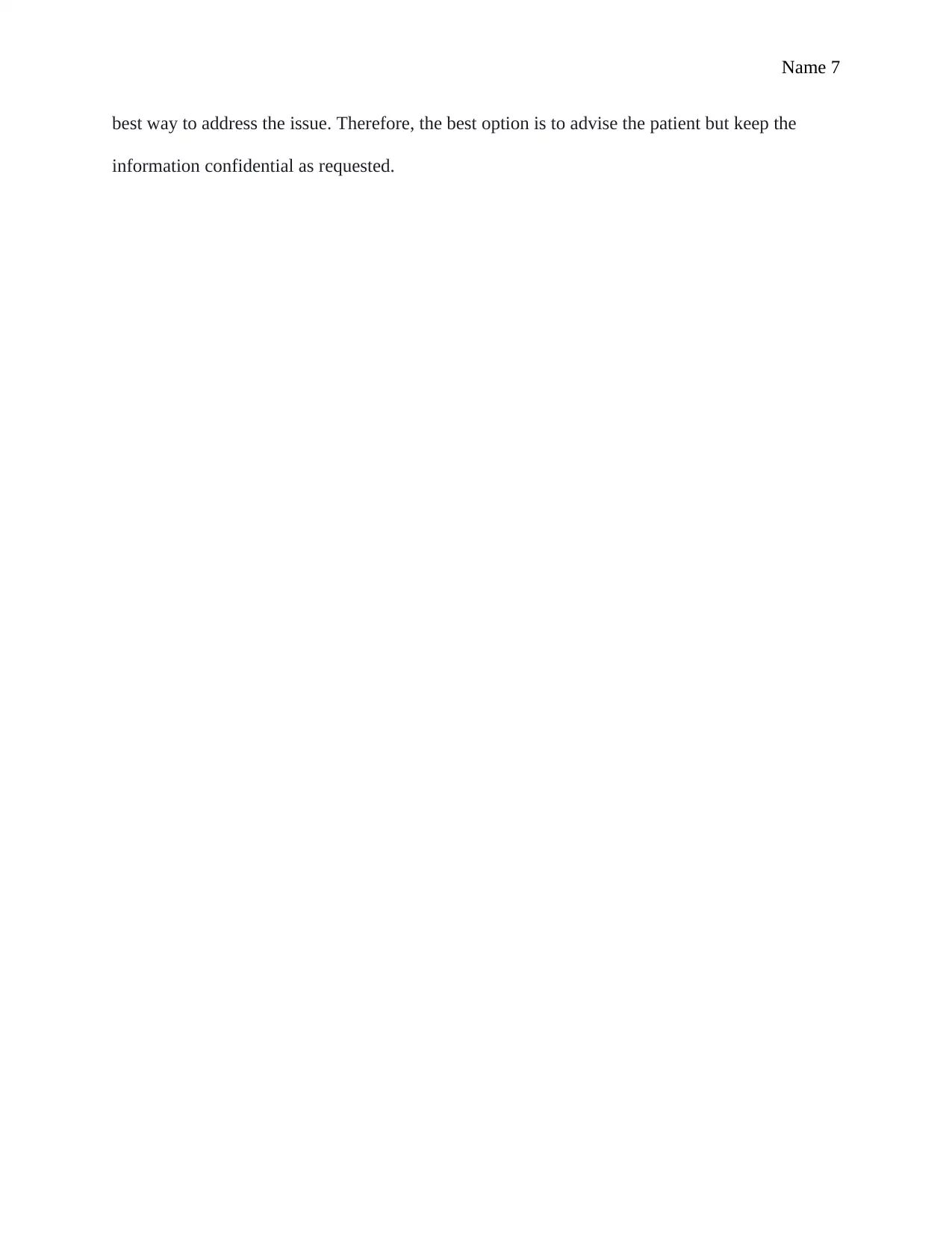
Name 7
best way to address the issue. Therefore, the best option is to advise the patient but keep the
information confidential as requested.
best way to address the issue. Therefore, the best option is to advise the patient but keep the
information confidential as requested.
Paraphrase This Document
Need a fresh take? Get an instant paraphrase of this document with our AI Paraphraser
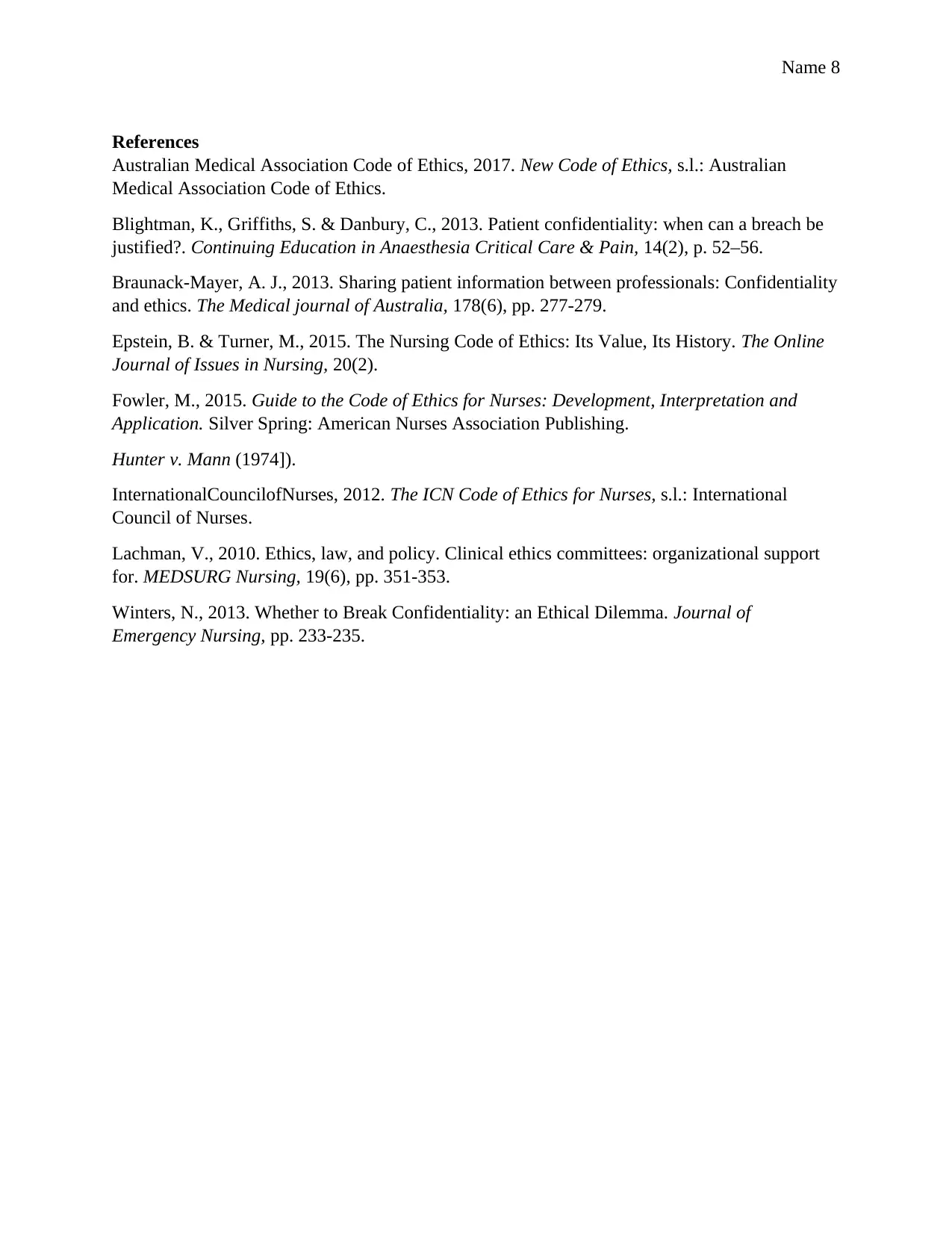
Name 8
References
Australian Medical Association Code of Ethics, 2017. New Code of Ethics, s.l.: Australian
Medical Association Code of Ethics.
Blightman, K., Griffiths, S. & Danbury, C., 2013. Patient confidentiality: when can a breach be
justified?. Continuing Education in Anaesthesia Critical Care & Pain, 14(2), p. 52–56.
Braunack-Mayer, A. J., 2013. Sharing patient information between professionals: Confidentiality
and ethics. The Medical journal of Australia, 178(6), pp. 277-279.
Epstein, B. & Turner, M., 2015. The Nursing Code of Ethics: Its Value, Its History. The Online
Journal of Issues in Nursing, 20(2).
Fowler, M., 2015. Guide to the Code of Ethics for Nurses: Development, Interpretation and
Application. Silver Spring: American Nurses Association Publishing.
Hunter v. Mann (1974]).
InternationalCouncilofNurses, 2012. The ICN Code of Ethics for Nurses, s.l.: International
Council of Nurses.
Lachman, V., 2010. Ethics, law, and policy. Clinical ethics committees: organizational support
for. MEDSURG Nursing, 19(6), pp. 351-353.
Winters, N., 2013. Whether to Break Confidentiality: an Ethical Dilemma. Journal of
Emergency Nursing, pp. 233-235.
References
Australian Medical Association Code of Ethics, 2017. New Code of Ethics, s.l.: Australian
Medical Association Code of Ethics.
Blightman, K., Griffiths, S. & Danbury, C., 2013. Patient confidentiality: when can a breach be
justified?. Continuing Education in Anaesthesia Critical Care & Pain, 14(2), p. 52–56.
Braunack-Mayer, A. J., 2013. Sharing patient information between professionals: Confidentiality
and ethics. The Medical journal of Australia, 178(6), pp. 277-279.
Epstein, B. & Turner, M., 2015. The Nursing Code of Ethics: Its Value, Its History. The Online
Journal of Issues in Nursing, 20(2).
Fowler, M., 2015. Guide to the Code of Ethics for Nurses: Development, Interpretation and
Application. Silver Spring: American Nurses Association Publishing.
Hunter v. Mann (1974]).
InternationalCouncilofNurses, 2012. The ICN Code of Ethics for Nurses, s.l.: International
Council of Nurses.
Lachman, V., 2010. Ethics, law, and policy. Clinical ethics committees: organizational support
for. MEDSURG Nursing, 19(6), pp. 351-353.
Winters, N., 2013. Whether to Break Confidentiality: an Ethical Dilemma. Journal of
Emergency Nursing, pp. 233-235.
1 out of 8
Related Documents
Your All-in-One AI-Powered Toolkit for Academic Success.
+13062052269
info@desklib.com
Available 24*7 on WhatsApp / Email
![[object Object]](/_next/static/media/star-bottom.7253800d.svg)
Unlock your academic potential
Copyright © 2020–2025 A2Z Services. All Rights Reserved. Developed and managed by ZUCOL.



